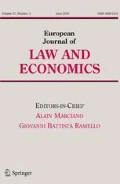Abstract
The subject of this paper is the influence of the Code Civil in the Netherlands. First, the history of the codification in the Netherlands is examined. Then, attention is paid to the Burgerlijk Wetboek (BW) of 1838, the predecessor of the Dutch civil code of the present day. It is investigated whether this BW is a copy of the Code Civil or a work on its own. Within this framework, the reasons why the Code Civil had an extraordinary influence are shortly mentioned. Finally it is explained how this BW has developed to our BW of 1992. The Code Civil was the model for the BW of 1838. This does not mean that the BW is a copy of the Code. It was not simply a translation. The BW is influenced by the Code Civil, but this does not justify the view that the Netherlands adopted French law. On the contrary: some French rules were removed. Former Dutch law was inserted instead of the French rules or as a supplement to the BW. A large part of the Code is based on joint roots, and the most important common background is Roman law. Those rules cannot be qualified as French law. Besides this there are also typical French provisions, some originated by the French Revolution. With regard to this rules the question is whether these are French rules or universal rights. It can be argued that the BW of 1838 is an improved version of the Code Civil.
Similar content being viewed by others
References
Asser, C. (1838). Het Nederlandsch Burgerlijk Wetboek vergeleken met het Wetboek Napoleon. Nagelaten werk van C. Asseruitgegeven door L. Asser en C.D. Assers Gravenhage en Amsterdam: De Gebroeders van Cleef.
Asser, C. & Scholten, P. (1931).Handleiding tot de beoefening van het Nederlandsch burgerlijk recht. Algemeen deel door P. Scholten. Zwolle: Tjeenk Willink.
Asser, C. & Scholten, P. (1974). derde druk: Hoofdstuk III; Het Burgerlijk Wetboek en zijn geschiedenis, pp. 223–250.
de Groot, H. (1631).Inleidinghe tot de Hollandsche Rechts-geleertheydts Gravenhage: Wed. Hillebrant Jacobsz. van Wou.
Milo, J. (1997). Hetrechtsvergelijkende argument in de ontwikkeling van het Nederlandse vermogensrecht 1838- 1940: aansprakelijkheid voor zaken, art. 2014, publiek domein en de relativiteit van de onrechtmatige daad, Antwerpen: Intersentia, Hoofdstuk 3, pp. 29–37. De tekst van het BW als uitgangspunt:1838.
van Kan, J. (1938). “Het BurgerlijkWetboek en de Code Civil.” In P. Scholten & E.M. Meijers (ed.), GedenkboekBurgerlijk Wetboek 1838-1938, Zwolle: Tjeenk Willink, pp. 243–276.
van Lunteren, A. S. (1928, 2). Overzicht van deGeschiedenis der Romeinsche en Oud-Nederlandsche Rechtsvorming, Groningen-Den Haag: Wolters.
Zwalve, W. J. (1993). Hoofdstukkenuit de geschiedenis van het Europese privaatrecht, Groningen: Wolters Noordhoff. Hoofdstuk VII: Codificatie in Nederland, pp. 243–309.
Zweigert, K. & Kötz, H. (1977). An Introduction to Comparative Law, I. The Framework, Amsterdam: North-Holland, pp. 78–111.
Author information
Authors and Affiliations
Rights and permissions
About this article
Cite this article
Meijer, G., Meijer, S.Y. Influence of the Code Civil in the Netherlands. European Journal of Law and Economics 14, 227–236 (2002). https://doi.org/10.1023/A:1020780914470
Issue Date:
DOI: https://doi.org/10.1023/A:1020780914470



